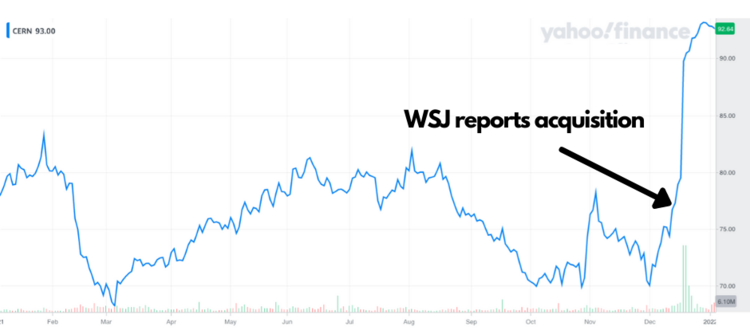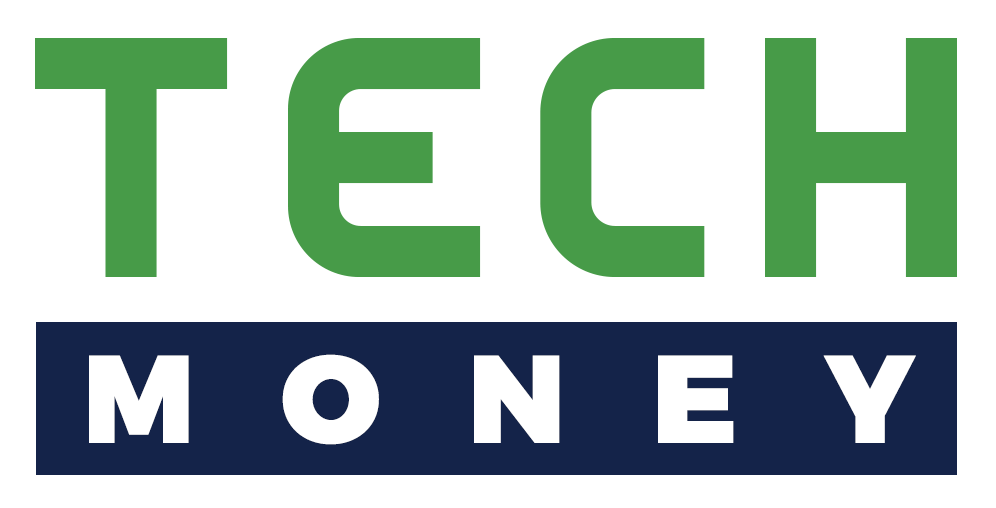On December 20th, 2021, Cerner put out a news release with the simple title Oracle Buys Cerner. As a former Kansas City tech employee who has gone through an acquisition, I feel you.
Anxiety runs high. Speculation becomes rampant! It can run the gamut from “we’re all getting canned tomorrow!” to “we’re saved!”

Rather than feed into the speculation, let’s focus on what we know about Cerner’s stock.
Two key details from the announcement are:
- It is an all-cash tender offer for $95/share
- The deal is expected to close in the calendar year 2022
When the Wall Street Journal broke the news, Cerner’s stock price shot up 17%. Since then and up to this writing, it’s hovering around $90-$93/share. This all makes sense since the Oracle deal is slated to buy up all shares at the stated $95 share price. I’d be surprised if it goes above $95 at any point prior to the deal closing.
The big question is what’s going to happen to my stock compensation?
Thankfully, Cerner released this Equity Awards FAQ that goes into the details. So much of what I’ll cover below is sourced from here, but translated into plain English, added color, and larger font.
Stock Outside of Your 401(k)
Understandably, there can be confusion as to whether you actually own Cerner stock or not.
Here are a few scenarios where this is the case:
- Do you have vested restricted stock units (RSUs)? You own the stock outright. It’s just like getting a cash bonus on the day it vested and using that cash to go buy Cerner stock.
- Have you previously exercised any stock options & held onto the shares? You own Cerner stock & it was purchased the date you exercised the options.
- Have you participated in the Employee Stock Purchase Plan (which they call the Associate Stock Purchase Plan or ASPP)? You own Cerner stock outright & it was purchased at the end of each window.
- Note that the last ASPP offering period ends March 31st, 2022. There will be no more offering periods of the ASPP after this date.
- Did you buy Cerner stock in your Robinhood account? Yep, you get the idea…
At this point, you have two choices:
- Sell it on the open market for whatever price it’s currently trading
- The shares will get sold for you at $95 when the deal closes
The resulting tax impact follows the rules of capital gains/losses. So you’ll need to know the price when you bought your shares vs. when they’re sold + the time between buying and selling.
Stock In Your 401(k)
It’s very common to see Cerner stock in your 401(k). That’s due in part because the company match used to be made in Cerner stock.
What happens to this stock?
Similar to the choices in the scenario above, you can always go into your 401(k) plan and sell it at the current market value. Otherwise, it gets sold at $95/share when the deal closes.
The big difference here is that, since it’s in a tax-sheltered account, there’s no tax impact of it getting sold. Keep in mind that you can’t just withdraw the money without following the normal 401(k) rules.
Unvested Restricted Stock Units (RSUs)
First, check your plan documents to see the details of the RSUs you have. If it contains “change of control” provisions (i.e. Oracle dropping $30B big ones), those will be honored.
I was perusing sec.gov (y’know, just for fun), and I have found two variations:
- For the 2011 Omnibus Equity Incentive Plan – Time Based Restricted Stock Agreement
- In the event of “Change of Control”
- 50% of your unvested shares will vest immediately
- 50% of each tranche will convert to Oracle shares and stay on the same vesting schedule.
- Side note: Tranche is French for “slice” & in this case is referring to each lot of RSUs that vest on a particular date. Now go impress your co-workers.
- An example:
- Current Vesting Schedule
- 1/1/2023: 300
- 1/1/2024: 300
- 1/1/2025: 300
- 1/1/2026: 300
- The deal closes on 10/1/2022
- On 10/1/2022, 600 RSUs immediately vest @ $95.
- You realize $57,000 in ordinary income (600 x $95). This will show up in Box 1 on your W2 along with your salary & any other bonus income.
- Some shares are held back & sold for tax withholding, as is standard for RSUs
- You receive the rest in cash
- The remaining unvested Cerner RSUs will get converted to Oracle RSUs. For the sake of ease, we’ll say it’s a 1-1 swap.
- New Vesting Schedule of Oracle RSUs
- 1/1/2023: 150
- 1/1/2024: 150
- 1/1/2025: 150
- 1/1/2026: 150
- On 10/1/2022, 600 RSUs immediately vest @ $95.
- Current Vesting Schedule
- In the event of “Change of Control”
- For the 2011 Omnibus Equity Incentive Plan – Director Restricted Stock Agreement
- In the event of “Change of Control”
- All unvested shares will vest immediately
- In the event of “Change of Control”
In the Equity Award FAQ, there is an additional distinction between RSUs that were granted before 2021 vs. granted in 2021.
There it states that RSUs granted in 2021 would have no acceleration of vesting & instead all will simply convert to Oracle RSUs of equivalent value. Bummer.
Stock Options
Vested Stock Options
From now up to the deal closing, your vested stock options will behave exactly the same.
The nitty-gritty details of how stock options work, especially when comparing Incentive Stock Options (ISOs) and Non-Qualified Stock Options (NQSOs), are outside of the scope of this article. In all honesty, I’ve not seen ISOs at Cerner but I’m including it here just in case.
Let’s assume you choose not to exercise & sell your options prior to the deal closing. In that case, your vested stock options will be cashed out at $95/share & the proceeds will be taxed as income
- An example:
- You have 1000 vested stock options with a grant price of $60/share
- You’d realize $35,000 of ordinary income: ($95-$60) * 1000
- For NQSOs, taxes will be withheld for federal, state, local, SS and medicare
- For ISOs, it is common for no taxes to be withheld automatically but they are still subject to federal, state, and local tax.
Note: Since Cerner stock has never before reached $95, all stock options would have been issued with a grant price lower than $95 & are therefore worth something!
Unvested Stock Options
This will work similarly to the 50/50 scenario for unvested RSUs.
For this, 50% of your unvested stock options will become vested. From there it will follow the same logic I laid out in the Vested Stock Option section
The remaining 50% of each tranche (there’s that word again) will convert to Oracle stock options & follow the same vesting schedule. While the number of options and grant price may change, the overall value of the options will be comparable.
OK, Got It. What Should You Do Now?
With many of these scenarios, there is a real possibility of a spike in income. With that, you may get pushed into a higher tax bracket than you’re used to.
Understand IRS income limits
Don’t get me wrong, paying more in taxes is simply a result of making more money. Also, having your equity compensation vesting accelerate like this loosens those golden handcuffs. So it’s a net positive.
But the IRS sets income limits to qualify for certain benefits. Here are some things to check to see if you would be affected:
- The ability to directly contribute to Roth IRAs
- Deductibility of Traditional IRA contributions
- Triggering Net Income Investment Tax
- Getting phased out of various tax credits and deductions
Lower Your Income?
Between these considerations and simply being in a higher tax bracket, you may look at ways to lower your income in 2022. Common strategies include:
- Increasing pre-tax 401(k) contributions, including your spouse’s if applicable
- Charitable giving (enough to itemize your deductions)
- Max your Health Savings Account
- Using/increasing any employee benefits, where it makes sense, that are funded from pre-tax contributions (Dependent Care FSA, FSA, etc.)
- Harvest any capital losses (sell investment losers in taxable brokerage account)
Understand Your Tax Liability
Lastly, a common surprise that greets people who receive a large amount of equity compensation in a particular year is that not enough is withheld to cover federal taxes. The default federal tax withholding on RSU and stock option income is 22%.
Let’s say that in 2022 you are pushed into the 32% marginal tax bracket. In that case, there is another 10% of your stock compensation income that will be needed to pay for taxes.
If this applies to you, the safest way is to pay estimated taxes to avoid a potential underpayment penalty.
Conclusion
I get it, there are a lot of unknowns and moving pieces right now. It’s natural to re-evaluate your situation and to be thinking of the different scenarios and outcomes. All the while, you’re probably getting the message from the company of “at this point, it’s still business as usual”.
But when it comes to your stock compensation, it’s anything but business as usual.
Be sure to reach out to me or any of the other network advisors should you need any further assistance!
This post was originally published on kansascityfinancialadvisorsnetwork.com

